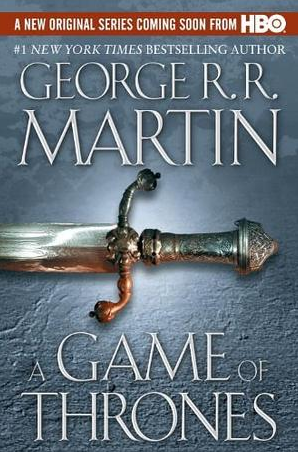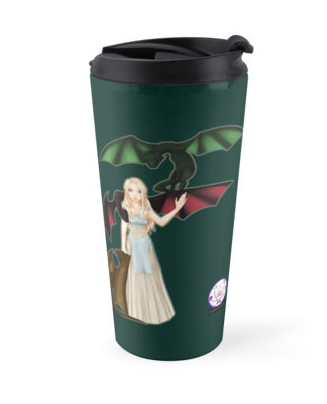 I had always thought to read The Game of Thrones series, but it seemed to me that if the author was never going to finish it, I wasn’t sure I wanted to start and get stuck waiting for an ending that would never come. (Fans waited six years for book five to come out.) When HBO announced it would be creating a series based on the books, I decided I had to read them–I knew I would be watching the show and thought it best to read the books too. (The book series was written to be somewhat unfilmable, so it would likely be complicated and a reading of the book would probably help clear things up.)
I had always thought to read The Game of Thrones series, but it seemed to me that if the author was never going to finish it, I wasn’t sure I wanted to start and get stuck waiting for an ending that would never come. (Fans waited six years for book five to come out.) When HBO announced it would be creating a series based on the books, I decided I had to read them–I knew I would be watching the show and thought it best to read the books too. (The book series was written to be somewhat unfilmable, so it would likely be complicated and a reading of the book would probably help clear things up.)
Now, with that preamble out of the way, I found myself greatly enjoying this series. It is not what you expect from a fantasy series. In fact, for the vast majority of it, it feels more like historical fiction than fantasy, as there is virtually nothing fantastical about it. We only get a handful of magic details and scenes at all–direwolves are sort of otherworldly in that they don’t exist, there are myths regarding whitewalkers, but other than the opening scene we don’t really see them, dragons are more or less extinct, and the only actual spells cast come near the very end of the book. And though the magical element is usually something I really look for in a fantasy series, I was surprised to find that it didn’t bother me that they were all but absent.
Martin has created a very in depth world filled with dozens of complex characters and history. One might even say too in depth, since there are so many characters that at times it is difficult to keep them straight. Many of the deaths lack impact because I was too busy thinking “wait, who was he again?” In Book 1, we follow eight primary characters in first person–some of the members of the Stark family (Eddard, Catelyn, Jon, Sansa, Arya, and Bran), Tyrion Lannister, and Daenerys Targaryen. Eddard Stark grew up best friends with Robert Baratheon, the man who he helped make him king of the Seven Kingdoms by deposing Aerys Targaryen, The Mad King. When King Robert comes to Winterfell, the Starks’ home, they are pulled into the already fraught political world of King’s Landing where the Lannisters plot for power and the last Hand of the King was mysteriously killed. While Eddard investigates why the Hand was killed, his children are left to navigate their new world–Bran, Rob, and Rickon must learn to rule Winterfell while Sansa and Arya must find their place in the capital and Jon, Eddard’s bastard, must fit in at the Wall where he has gone to help protect the realm from more dangerous things up North. Meanwhile in the East, Daenerys Targaryen has been sold by her brother Viserys, the last male heir of the deposed Targaryen family, to Khal Drogo, the leader of one of the barbarian-like Dothraki tribes.
For me, some characters’ stories are much stronger than others. Where Sansa is a believable teenager in some ways she seems much too stupid, materialistic, and whiny for a Stark of Winterfell and was hard to relate to. (It is true she was born into nobility and was raised to be a gentle lady, but she can be lady-like and have a realistic view of the world.) Arya, on the other hand, was interesting and exciting as she was determined to defy the world and expectations placed on her for being a daughter of a noble family. Bran seems largely unimportant beyond the things he sees in the very beginning, though there are hints of bigger things to come for him. (It might have been more interesting to see things from Robb’s perspective as he was forced to take up the mantle of Lord of Winterfell, but no such luck.) Catelynn is an irritating character, but mostly because I don’t care for her personality (and particularly the cruel way she treats Jon). It also seems like she does not know Arya very well at all, whereas Eddard, despite being extremely busy, understands his youngest daughter fairly well (though he does not seem to understand Sansa much at all).
Most impressive about this series is how complicated it is while still managing to hold my attention. How Martin keeps it all straight in his head is anyone’s head. The big picture storyline was easy to follow when I could easily have gotten lost (in the same way as Robert Jordan’s Wheel of Time series sometimes did when talking about random characters that we have not seen or heard from for hundreds of pages or even entire books). Martin balances the different parts of the story well so that we get as much as we need from each storyline without forgetting what is happening in the others.
Best of all, Martin manages to come up with twists and surprises that I never saw coming. You can’t ask for much more.

To hear a TV viewer’s point of view of the show Game of Thrones check out episode 17.

